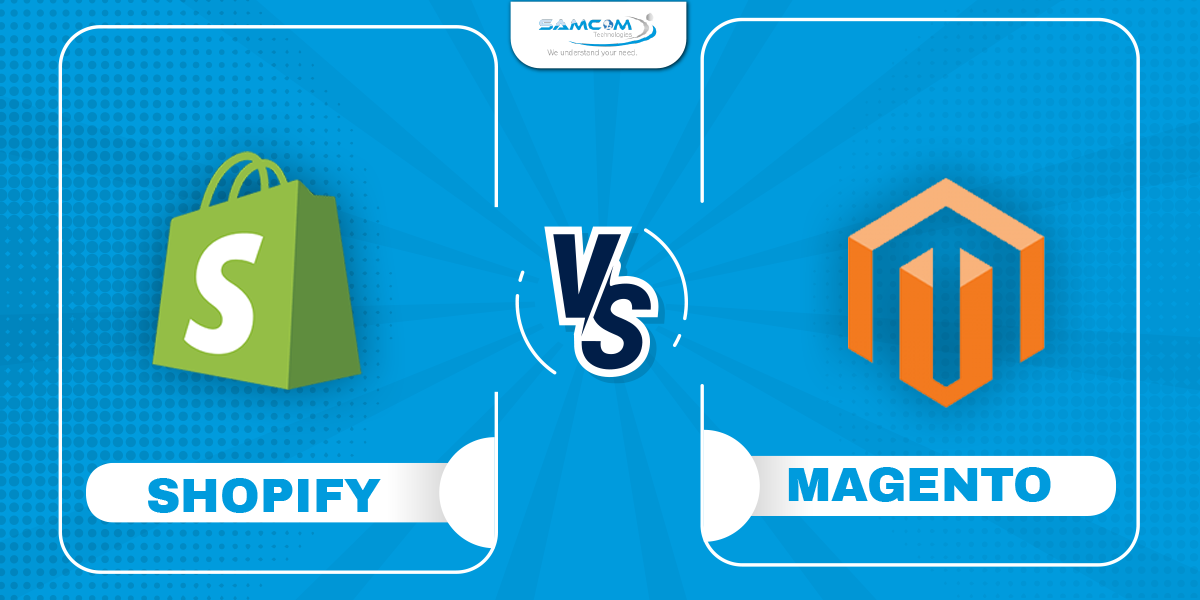
Blog
Shopify vs. Magento: Which Is Better To Use for the Online Ecommerce Website?

Well, if you are in eCommerce business, you are probably familiar with the dilemma when it comes to build your eCommerce website. As business owner, you want the best for your business. So when it comes to choosing your eCommerce platform, it becomes a bit difficult.
There are plenty of eCommerce platforms available in the market. But Shopify and Magento are the most popular of all of them. Shopify is an easy solution for building an online store, whereas Magento is an open-source platform that is free to install on your computer.
Both are well advanced and has excellent features suitable for every type of business, thus, it becomes essential that you choose what’s best suited for your business.
So let’s take a look which is better to use for the online eCommerce Website.
Comparison Between Shopify & Magento
1. Price
Because Magento and Shopify have distinct pricing models, it's hard to say which is more affordable. The cost of Magento depends on your requirements, as it is an open-source platform. However, Shopify's fixed pricing may seem cheaper, but there are additional costs because you have to pay for apps and themes.
Shopify prices start from $29 to $299 per month. Where Magento may cost you around $5844 to $14185 per annum.
2. Themes
Magneto themes can cost up to $499. Magento themes offer flexible customization, animations, ability to add a featured product slider to the homepage, add a newsletter, and cross-selling blogs on the product page. On the other hand, Shopify offers 9 free and 88 premium themes that costs around $150 to $350. Making it affordable compared to Magento.
3. Apps and Integration
Shopify's apps and extensions are much closer to those of WordPress in terms of options. You can choose from thousands of apps, both free and paid. It is important to keep in mind, however, that some of these options require coding knowledge.
The Magento platform has thousands of free and paid extensions as well. It is still possible to add a lot of functionality without any coding knowledge even if you are not a member of the magneto developer community.
Your website can be enhanced with gift cards and abandoned cart functionality. With SaaS apps from around the web, business owners can also implement things like pre-order functionality or banner sliders. The Magento platform offers many benefits for your ecommerce business, no matter what your goals are.
4. Payment Methods
You can accept online credit card payments and other transactions from your customers with both Magento and Shopify. Shopify even offers an integrated payment system, Shopify Payments. As a result, you will be able to avoid the transaction fees Shopify otherwise charges.
With over 150 payment integration options, Magento supports all the major payment processors. Additionally, you can sell to customers overseas with a variety of payment options in multiple languages and countries.
Despite Shopify's easy and quick integration of payment processors, Magento's international sales options are more extensive.
5. Usage
It is fairly easy for an individual to set up an online store with Shopify and Magento Open Source, which come with well-designed and well-thought-out user interfaces.
Shopify has a wizard mode that allows users to set up their stores very easily without any technical support, whereas Magento doesn't have this feature.
Additionally, Magento is not a hosted solution. Therefore, procuring their own hosting and setting up their store with Magento is not easy or convenient for users to do on their own.
6. Core Functionality
Magento has two core functionalities. Robust inventory and order management functions and multi-channel business solutions. Get in touch with best Magento Development Company to create your ecommerce online website
On the other hand, Shopify has reduction of cart abandonment rate and partnering with shipping partners.
Both magento and Shopify offers POS functionality, but magento has third-party POS and Shopify has first-party POS system.
7. Community Support
When it comes to community, Magento has a lager developer community. Anyone can browse old threads to get their desired solution or simply ask the question. Magento developers are active across the globe, so you can easily get an answer.
Additionally, Magento has FAQ section and help centre containing best practices.
Shopify customer support has 24*7 phone, email, and chat options. Also, you can find your solution by watching video tutorials, reading blogs, or with help centres.
8. Security
Magento doesn’t offer built-in security mechanism. But, it allows users to make necessary security changes for the website. For the safety of the website, they regularly release updates. Magento 2 allows users to install security extensions.
Shopify has built-in SSL encryption that allows users to protect their website automatically. But it’s still no match for Magento updates for security.
End note
Both Magento and Shopify are powerful eCommerce platform. But Shopify wins this battle.
Shopify is easy to use with all of its powerful functionality. Magento is great too, but it requires technical people to set everything up(not all business in the beginning can afford that). Connect with best shopify development agency to develop your online ecommerce store
Well, it’s completely our point of view. You can always choose what’s best for your business that helps you make your presence in the online market.


We are committed to providing superior custom software development solutions that meet your business requirements.
Address
India
18 – 19, 4th Floor, 4D Square Mall, Motera, Ahmedabad 380005, India.
Canada
3030, Boul Le Carrefour, Laval, QC H7T 2P5, Canada.
USA
340 S Lemon Ave. #7784, Walnut, California, 91789, United States.
Contact Us
Mon to Fri 10.00 AM - 8.00 PM
Copyright © 2012-2024. All Rights Reserved by Samcom Technologies.